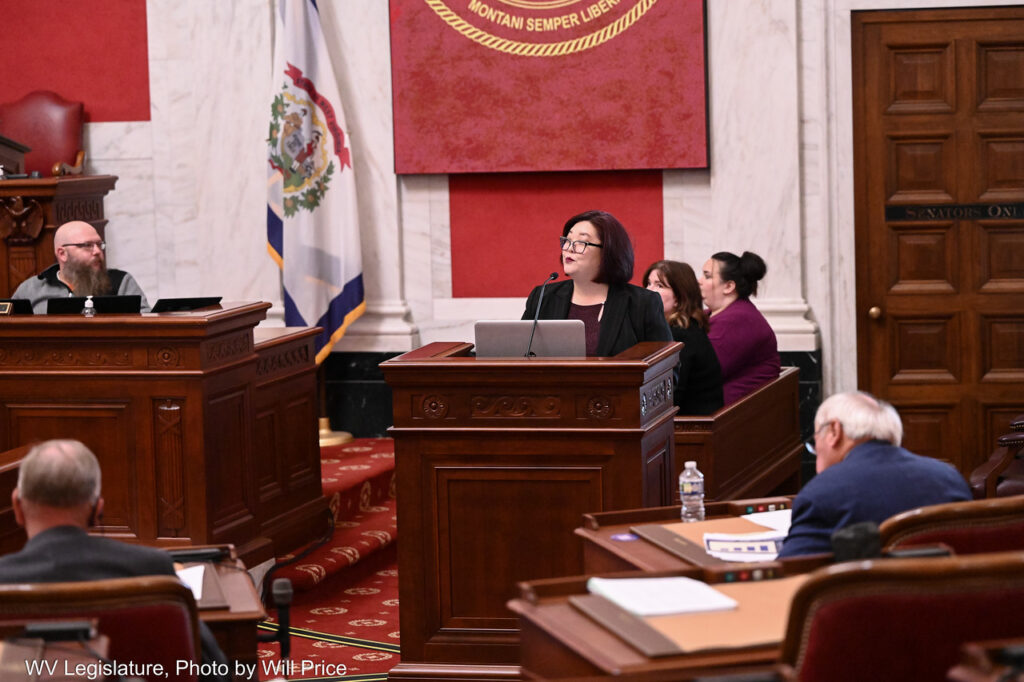West Virginia’s foster care system has long struggled with limited resources and public oversight. In an effort to improve it, the West Virginia Legislature overhauled foster care statewide in 2019. This included hiring new state officials who advocate for youth in state care: foster care ombudsmen.
Today, eight ombudsmen across the state investigate complaints in West Virginia’s child welfare system and collect data about foster care. Over the years, lawmakers have expanded the scope of their work, as well as the independence of their office.
The ombudsmen report to the state’s inspector general, as well as the deputy director of the state’s Office of the Foster Care Ombudsman. The latter role is currently held by Acting Director Elizabeth Hardy, who said the ombudsmen do important work statewide.
Hardy gave a presentation explaining some common misconceptions about an ombudsman’s role in the state’s foster care system.
“We’re blessed to have eight amazing foster care ombudsmen throughout the state doing direct contact complaint work and investigations,” she said.
Since House Bill 3061 was passed in 2023, the ombudsmen have investigated abuse and neglect allegations in the child welfare system, plus cases from youth in the juvenile justice system. Previously, ombudsmen could only investigate complaints involving a foster child, foster parents or kinship parents.
Most recently, during the 2024 regular legislative session, lawmakers passed Senate Bill 300.
“Senate Bill 300 made it clear that our Office of Inspector General is independent and impartial,” Hardy said. “Thank you to those who fought so hard to pass that bill. Thereby, our office continues to share aggregate data trends with the Department of Human Services Leadership.”
Hardy explained the main objectives of the foster care ombudsman’s office.
“We educate, we empower, we assist, we endorse, we advocate, negotiate, observe, report, recommend and we suggest,” Hardy said.
According to Hardy, the ombudsman enforces the state’s Foster Kinship Parent Bill of Rights and the Foster Child Bill of Rights.
“What we don’t do is we don’t direct or manage, we don’t instruct or rule,” Hardy said. “We don’t adjudicate, order, decide, discipline, demand or enforce.”
Hardy reported that since its inception in 2019, the Office of the Foster Care Ombudsman has received more than 3,000 complaints.
“Compared to the state fiscal year of 2024 we have received almost an additional 700 complaints, which is a 171 percent increase,” Hardy said. “This data trend shows our office’s relevance as a value by the substantial increase in the number of complaints over time.”
Hardy’s work today is informed by her own experience as a foster parent in West Virginia. About a decade ago, she and her husband fostered two three-month-olds. She said she felt scared and alone throughout the process.
“This office didn’t exist then. But if it did, someone would have told me that I was not alone,” Hardy said. “Someone would have educated me about the process, and someone would have given me resources, and that is what our office is today.”
She said a large obstacle to achieving the Office of the Foster Care Ombudsman’s goals is public misunderstanding over its structure.
“To the public, it may still appear we’re under the control or influence of the Department of Human Services,” Hardy said. “This is why our office needs to do more education around the separation of our office to showcase its independence and its impartiality.”
Aside from improving public relations, Hardy said the goal for the Office of the Foster Care Ombudsman is to continue developing a new case management system and to improve child welfare data metrics.
“We want to continue collaborating, working together with child welfare leaders throughout the state to make the most impact on systemic reform,” she said.
After her presentation, Del. Mike Pushkin, D-Kanawha, asked Hardy how communication gaps between her office and the public could be filled.
Hardy said the ombudsman’s office has a website, phone number and electronic assistance forms that families can fill out online.
“They’re welcome to call us or email us, and we will be able to provide them support throughout the entire state of West Virginia,” Hardy said.
Pushkin asked if Hardy’s office has received complaints about finding placements for older foster children.
“Over the past several years, we’ve heard about some of the older children that we can’t find placement for, being put in hotels and motels and state parks,” Pushkin said. “Do you receive complaints about that?”
Hardy said that finding older children foster homes is an ongoing problem.
“We don’t have enough place for our children, and we are trying to work collaboratively to try to figure out what we can do,” Hardy said.
There are currently 6,135 children in West Virginia’s state custody.

























